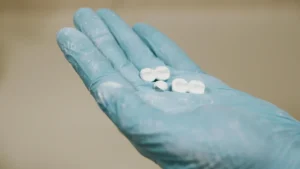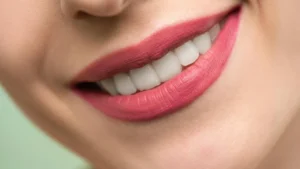Understanding these costs can help you make an informed decision. Read further to discover how various factors influence these prices and what additional expenses you might encounter.
What Are Tooth Caps?
Tooth caps, or dental crowns, are an essential component of modern dentistry. At My New Tooth, we specialize in providing high-quality dental crowns to residents of the Innisfil area. A dental crown is a custom-made cap designed to fit over a tooth, covering it completely. Its primary function is to restore a tooth’s shape, size, and strength, or to improve its appearance.
Typically, dentists recommend tooth caps for several reasons. Common scenarios include protecting a weak tooth from breaking, restoring an already broken tooth, covering and supporting a tooth with a large filling, holding a dental bridge in place, covering a dental implant, or making a cosmetic modification. It’s a versatile solution in restorative dentistry that can significantly impact your dental health and confidence.
Why Tooth Caps Are Necessary
Tooth caps offer a multifaceted solution for various dental issues. Here are several situations where you might need a dental crown:
- Severe tooth decay: When a tooth has extensive decay that can’t be addressed with a filling, a crown may be necessary to provide support and maintain functionality.
- Broken or fractured teeth: Crowns can cover and offer protection to teeth that have been broken or chipped, thus preventing further damage.
- Post-root canal treatment: After a root canal procedure, the tooth becomes more fragile. A crown can strengthen and protect it from breaking.
- Aesthetic purposes: Crowns can improve the appearance of discolored or misshapen teeth, providing a more uniform and aesthetically pleasing smile.
- Dental implants: Crowns are mounted on dental implants to replace missing teeth, restoring both function and aesthetics.
- Large fillings: If a tooth has a large filling, a crown can provide additional support and prevent fractures.
By addressing these issues with dental crowns, you can ensure lasting protection and function for your teeth.
Factors Influencing the Cost of Tooth Caps
Several factors can significantly influence the cost of dental crowns. Knowing these can help you make better decisions regarding your dental care.
Material of the Crown
The material used to create the tooth cap is a primary cost driver.
- Metal crowns: Durable but less aesthetically pleasing. They are ideal for back teeth and often cost less.
- Porcelain-fused-to-metal (PFM): Combines the strength of metal with a more natural appearance.
- All-ceramic or all-porcelain: Offers the best aesthetic results, making them ideal for front teeth.
- Zirconia: Known for its durability and aesthetic appeal, and is generally more costly.
- Gold crowns: Durable and bio-compatible, but typically more expensive.
Location of the Dentist
The geographical location of your dental clinic plays a crucial role. For instance, in Innisfil, Ontario, prices may vary compared to larger cities due to differences in living costs and operational expenses.
Expertise of the Dentist
Dentists with specialized training or extensive experience may charge more for their services. However, this often translates into better-quality work and long-term benefits.
Additional Procedures
Additional dental procedures can also affect the total cost. These may include tooth preparation, temporary crowns, and follow-up visits, each adding to the overall expense.
Understanding these factors will empower you to make informed decisions about your dental health.
Types of Tooth Caps and Their Costs
Knowing the types of tooth caps available can help you choose the best option for your needs and budget.
Metal Crowns
Metal crowns are known for their durability and longevity. They can withstand chewing and biting forces well and are less likely to fracture.
- Cost range: $1,000 to $3,000 per crown.
- Pros: Highly durable, less tooth removal needed.
- Cons: Metallic color, not suitable for front teeth.
Porcelain-Fused-to-Metal (PFM) Crowns
PFM crowns combine the strength of metal with the natural aesthetic of porcelain. These crowns are versatile and can be used for both front and back teeth.
- Cost range: $1,000 to $3,500 per crown.
- Pros: Good strength and aesthetics, relatively affordable.
- Cons: Can cause wear on adjacent teeth, the metal part may show if gums recede.
All-Ceramic or All-Porcelain Crowns
These crowns provide the best natural color match and are ideal for front teeth. They are also a good option for people with metal allergies.
- Cost range: $1,200 to $3,500 per crown.
- Pros: Best natural look, metal-free.
- Cons: Less durable than metal-based crowns, more expensive.
Zirconia Crowns
Zirconia crowns are popular due to their strength and compatibility with human tissue. They are a good option both for back and front teeth.
- Cost range: $1,500 to $3,000 per crown.
- Pros: Highly durable, natural appearance, fewer risks of allergies.
- Cons: More expensive, can cause wear on opposing teeth.
Gold Crowns
Gold crowns are durable and require minimal tooth removal. They are typically used for molars where they’re less visible.
- Cost range: $1,000 to $3,000 per crown.
- Pros: Long-lasting, minimal tooth removal.
- Cons: High cost, metallic appearance.
Cost Comparison: Front Teeth vs. Molar Crowns
When it comes to capping front teeth versus molars, several factors can influence the cost differences.
Front Teeth Crowns
- Material: All-ceramic or all-porcelain crowns are often recommended for front teeth due to their natural look.
- Cost: These crowns are more costly, typically ranging from $1,200 to $3,500 each.
- Aesthetics: Appearance is a significant consideration, leading to higher costs.
Molar Crowns
- Material: Metal or gold crowns are usually used for molars due to their strength.
- Cost: Generally lower, ranging from $1,000 to $3,000 each.
- Durability: Strength and longevity are prioritized over aesthetics.
Knowing which type of crown suits your need will help you manage your dental expenses effectively.
Understanding the Procedure and Its Impact on Cost
The procedure for dental crowns involves several steps, each contributing to the overall cost. Here’s a breakdown of what to expect.
Initial Consultation
The process starts with an initial consultation where the dentist evaluates your condition, discusses options, and creates a treatment plan. This visit often includes X-rays to assess the health of the tooth.
- Cost: Typically ranges from $50 to $200.
Tooth Preparation
In the next step, the tooth is prepared to make room for the crown. This may involve reshaping the tooth and removing any decay. If there is insufficient tooth structure, a build-up or core may be necessary.
- Cost: Preparation and build-up can add an extra $100 to $300 to the total cost.
Impression and Temporary Crown
After preparation, an impression of the tooth is taken to create a custom crown. A temporary crown is placed over the tooth to protect it until the permanent crown is ready.
- Cost: Taking impressions usually costs between $20 and $200. Temporary crowns generally add another $200 to $500.
Final Fitting
When the permanent crown is ready, the temporary crown is removed, and the new crown is fitted and adjusted to ensure proper bite and comfort. This step involves cementing the crown into place permanently.
- Cost: The fitting and placement of the permanent crown are usually included in the initial quoted cost of the crown.
Follow-Up Visits
Some cases require follow-up visits to ensure the crown fits well and functions correctly. Any necessary adjustments can also be made during these visits.
- Cost: Follow-up visits can cost between $50 and $200 per visit.
Understanding these steps will help you estimate the overall cost of tooth caps, especially if you are considering treatment in Innisfil.
Additional Costs to Consider
When planning for dental crowns, you need to anticipate several additional expenses beyond the base cost of the crown itself. At My New Tooth, our goal is to ensure you have a clear understanding of all potential costs involved in your treatment.
Initial Consultations and X-rays
Before proceeding with tooth caps, you will need an initial consultation to evaluate the condition of your teeth. This initial visit usually includes X-rays to help the dentist assess the damage and plan the treatment.
- Consultation costs: Typically range from $50 to $200.
- X-ray costs: Range from $20 to $250, depending on the type and number of X-rays needed.
Temporary Crowns
Temporary crowns protect your tooth while the permanent crown is being made. These are a crucial part of the process and add to the overall cost.
- Temporary crowns: Costs usually range from $200 to $500.
Advanced Imaging
In some cases, advanced imaging like CT scans may be required. These provide a detailed view of your tooth and surrounding bone structure, facilitating precise treatment.
- CT scans: Can cost between $250 and $1,000.
Follow-Up Visits
Follow-up visits are often necessary to ensure the crown fits properly and functions well. These visits might involve minor adjustments or further consultations.
- Follow-up visits: Typically range from $50 to $200 per visit.
Understanding these additional costs will help you budget more effectively for your dental treatment.
Insurance and Payment Options
When it comes to the cost of tooth caps, insurance can significantly reduce your out-of-pocket expenses. However, it’s essential to understand what your insurance will cover and explore alternative payment options if needed.
Insurance Coverage
Dental insurance often covers up to 50% of the cost of necessary crowns. Most insurance plans have an annual maximum limit, usually between $1,000 and $2,000, which can significantly impact your total cost.
Key points:
- Check with your insurance provider to understand your coverage.
- Verify if the type of crown you need is covered.
Dental Discount Plans
For those without insurance, dental discount plans offer a viable alternative. These plans require an annual fee but provide discounted rates for various dental procedures, including crowns.
- Annual fees: Usually range from $100 to $200.
- Discounts: Can range from 10% to 50% off the total cost.
Financing Options
If the cost of tooth caps is a concern, many dental clinics, including those in Innisfil, offer financing options. These plans allow you to spread the cost over several months, making it more manageable.
- Payment plans: Often available through third-party financing companies.
- Interest rates: Vary depending on the provider and your credit score.
Exploring these payment options can help you proceed with your dental treatment without undue financial strain.
How to Choose the Right Tooth Cap for Your Needs
Choosing the right type of tooth cap is crucial for both functionality and aesthetics. Here’s how you can make an informed decision tailored to your needs and budget.
Location of the Tooth
The location of the tooth that needs a crown will influence your decision. For front teeth, aesthetics are paramount. For molars, strength and durability are more critical.
- Front teeth: All-ceramic or all-porcelain crowns are ideal for their natural look.
- Molars: Metal or gold crowns offer excellent durability and longevity.
Material and Durability
Different materials offer varying levels of durability and appearance. Your choice may depend on your budget and specific dental needs.
- Metal crowns: Best for strength, particularly for back teeth.
- Porcelain-fused-to-metal crowns: Balance between strength and aesthetics.
- Zirconia crowns: Offer durability and a more natural appearance, suitable for both front and back teeth.
Budget Considerations
Your budget will ultimately play a significant role in your choice. While higher-end crowns like zirconia or all-porcelain may offer better aesthetics and durability, they also come with a higher price tag.
- Evaluate your budget: Consider both the initial cost and potential additional expenses.
- Consult with your dentist: Get professional advice to balance cost, aesthetics, and durability.
Considering these factors will help you choose the most suitable tooth cap for your specific needs and financial situation.
Affordable Alternatives to Traditional Tooth Caps
If traditional tooth caps are outside your budget, there are more affordable alternatives available that can address some of your dental issues effectively.
Dental Bonding
Dental bonding involves applying a tooth-colored resin to the affected tooth, which is then hardened with a special light. This is a less invasive and more affordable option, though not as durable as crowns.
- Cost: Typically ranges from $200 to $600 per tooth.
- Pros: Less expensive, quick procedure.
- Cons: Less durable, may require more frequent replacements.
Veneers
Veneers are custom-made shells designed to cover the front surface of a tooth. They are primarily used for cosmetic improvements rather than for structural support.
- Cost: Ranges from $800 to $2,500 per tooth.
- Pros: Aesthetic appeal, less tooth removal required.
- Cons: More expensive than bonding, not suitable for severely damaged teeth.
Onlays and Inlays
Onlays and inlays fit into the tooth’s chewing surface and are a compromise between fillings and crowns. They offer more strength than fillings and require less removal of the tooth structure than crowns.
- Cost: Can range from $700 to $1,500 per tooth.
- Pros: Durable, requires less removal of the tooth structure.
- Cons: Higher cost compared to fillings.
Exploring these more affordable alternatives can provide solutions that fit both your dental health needs and your budget.
Aftercare and Maintenance Costs
After getting a dental crown, proper aftercare and maintenance are crucial for ensuring longevity and avoiding additional costs.
Regular Dental Check-ups
Routine dental check-ups are essential to monitor the condition of your crown and the overall health of your teeth.
- Cost: Regular check-ups usually range from $100 to $200 per visit.
Potential Adjustments
Sometimes, minor adjustments are needed to ensure the crown fits perfectly. These could occur shortly after the fitting or during subsequent check-ups.
- Adjustment costs: Typically between $50 and $200.
Dental Hygiene Products
Investing in good dental hygiene products will help maintain both your natural teeth and crowns.
- Electric toothbrushes: Can range from $50 to $200.
- Fluoride toothpaste and mouthwash: Usually cost between $5 and $20 each.
Regular maintenance not only prolongs the life of your crown but also contributes to your overall dental health.
FAQs About Tooth Caps Cost
To help you further understand the cost of tooth caps, here are some frequently asked questions and their answers.
Are Tooth Caps Covered by Insurance?
Most dental insurance plans cover part of the cost of tooth caps, often up to 50%. However, the annual maximum limit on your plan might influence out-of-pocket costs.
How Long Do Tooth Caps Last?
The lifespan of a dental crown varies based on the material used and how well you care for it. On average, crowns can last between 5 to 15 years.
What Are the Most Cost-Effective Materials for Crowns?
Metal crowns are generally the most cost-effective, followed by porcelain-fused-to-metal. All-ceramic and zirconia crowns offer better aesthetics but usually at a higher cost.
Does Getting a Tooth Cap Hurt?
The process typically involves local anesthesia to numb the area. Most patients report minimal discomfort during and after the procedure.
Can I Get a Discount for Multiple Crowns?
Some dental clinics offer discounts for multiple crowns, or you might benefit from lower costs if you opt for a dental discount plan.
Understanding these common questions can better prepare you for the financial and procedural aspects of getting tooth caps.
Conclusion
Understanding the various costs involved in getting tooth caps is essential for making informed decisions about your dental health. Whether you’re considering metal, porcelain, or zirconia crowns, knowing the factors that influence cost, the types of crowns available, and additional expenses can help you budget effectively.
For residents of Innisfil, consulting with a qualified dental professional at My New Tooth can provide personalized advice and treatment plans. This comprehensive understanding enables you to choose the best option for your needs and ensures long-lasting dental health.




